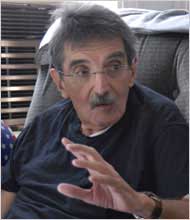A Wordsmith Rallies to Reclaim ‘That Guy’
by Corey Kilgannon, New York Times, September 28, 2008

THE ROAD BACK Ed Lowe, 62, the former Newsday columnist, had a serious stroke in January. At the moment, he can’t write, but plans to finish a novel.
LONGTIME readers of Newsday can recall some pretty remarkable Ed Lowe columns over the years.
But perhaps the most dramatic Ed Lowe story is the one he is now living. Mr. Lowe suffered a near-fatal stroke in January. After months on life support and being unable to speak, he is back home, living with his companion, Susan Hennings, in her cozy house here on Nassau Road.
He kept his life but not his lifeblood – his words. Ed Lowe can no longer write, and he is crushed. He has begun to speak again, but he is far from regaining that gift of gab that made him one of the most prominent raconteurs in these parts.
“Sometimes I get down, and start thinking, ‘If I was put on this planet to speak and write – which were the things I could do well – and that’s all gone, why am I not dead?’ ” he said when I visited him on Tuesday.
In halting speech, he wondered if the stroke, and its cruel toll, was some kind of payback for the charmed life he has led as Long Island’s chief storyteller.
“If you were going to punish me, you’d punish me this way,” he said. “It couldn’t be something like, ‘You’ll never practice archery again.’ ”
Ah, the old Ed Lowe wit. And he even looked the same – with his still-full head of hair and mustache. You could tell by his expressions and immediate, clear answers to questions that his understanding came through intact. His mind is sharp, but in that specific room where thought is processed into words, the mental furniture has been rearranged.
With his glasses perched on his nose, he often looks poised on the cusp of another Ed Lowe story, but his sentences quickly sputter and stall as he gropes for some word or name that is right there, but somehow not.
How else can you say it: the wordsmith has been deserted by his words, the beloved, trusted words he once marshaled with such authority.
But despite his despair, Mr. Lowe, 62, is not admitting defeat. He is determined to learn how to write all over again, and although he has lost control of the right side of his body, he is training himself to type with his left hand.
Ms. Hennings has challenged him by sticking on the refrigerator a large photograph that was the head shot that used to run with his column. This is to remind him of the old Ed, the man who for nearly 30 years wrote poignant, painful but ultimately funny and uplifting tales about everyday people from Montauk to Great Neck. The guy with the best-known byline on Long Island.
“He thinks he’s no longer that guy,” she said, “but to me he’s still that guy.”
She said his columns always took precedence over his health. So did his friends and readers, and now they have rallied around him. Friends and strangers send money, cook meals, hold fund-raisers and drive him to therapy. Mr. Lowe had the stroke in Vermont, but a consortium of South Shore bar owners quickly raised $5,000 to help transport him back to Long Island.
Mr. Lowe, who began working for Newsday in 1964 as a copyboy, reluctantly accepted a buyout and left Newsday in December 2004, and it broke his heart. Although he became a columnist for The Long Island Press, a free weekly, his writing was longer-winded and meandering.
He had written an 800-page draft of a novel when the stroke hit, and he wants to finish it. He also wants to write about his stroke and its painful lessons about the depths of loss and love.
At the heart of this is Ms. Hennings, who Mr. Lowe customarily introduced as “the love of my life” and who has become his tireless caregiver. The two met through Bette Davis, who spent the summer of ’82 in a house near the Hennings family in Huntington Harbor and befriended Ms. Hennings’s son Charlie, who was 8 at the time. Mr. Lowe wrote a column about it and wrote a follow-up after Ms. Davis called him to tell him it was “smashing.”
Ms. Hennings works full time as a nurse at North Shore University Hospital at Syosset, and has given her life to nurse Mr. Lowe back to health and happiness. Mr. Lowe sometimes feels bad about this. He told her recently that he knew he had become a burden and that she should find another companion.
“I told her, ‘Go, you’re free,’ ” he said softly from his easy chair, the house quiet and the sun intruding through the back door. “We had a great, full life, and then it wasn’t so nice.”
Ms. Hennings has declined.
“He’s not getting rid of me,” she said. “He thinks I consider him a burden, but he doesn’t realize this all has made me a better person. He’s the love of my life, and I can’t let him give up.”
She hopes the whole thing will end up like another Ed Lowe column: sad and trying and harrowing, but finally uplifting.
“He was the thread that stitched together Long Island,” she said, “and we still need him to write about us.”
Copyright 2008 The New York Times Company
